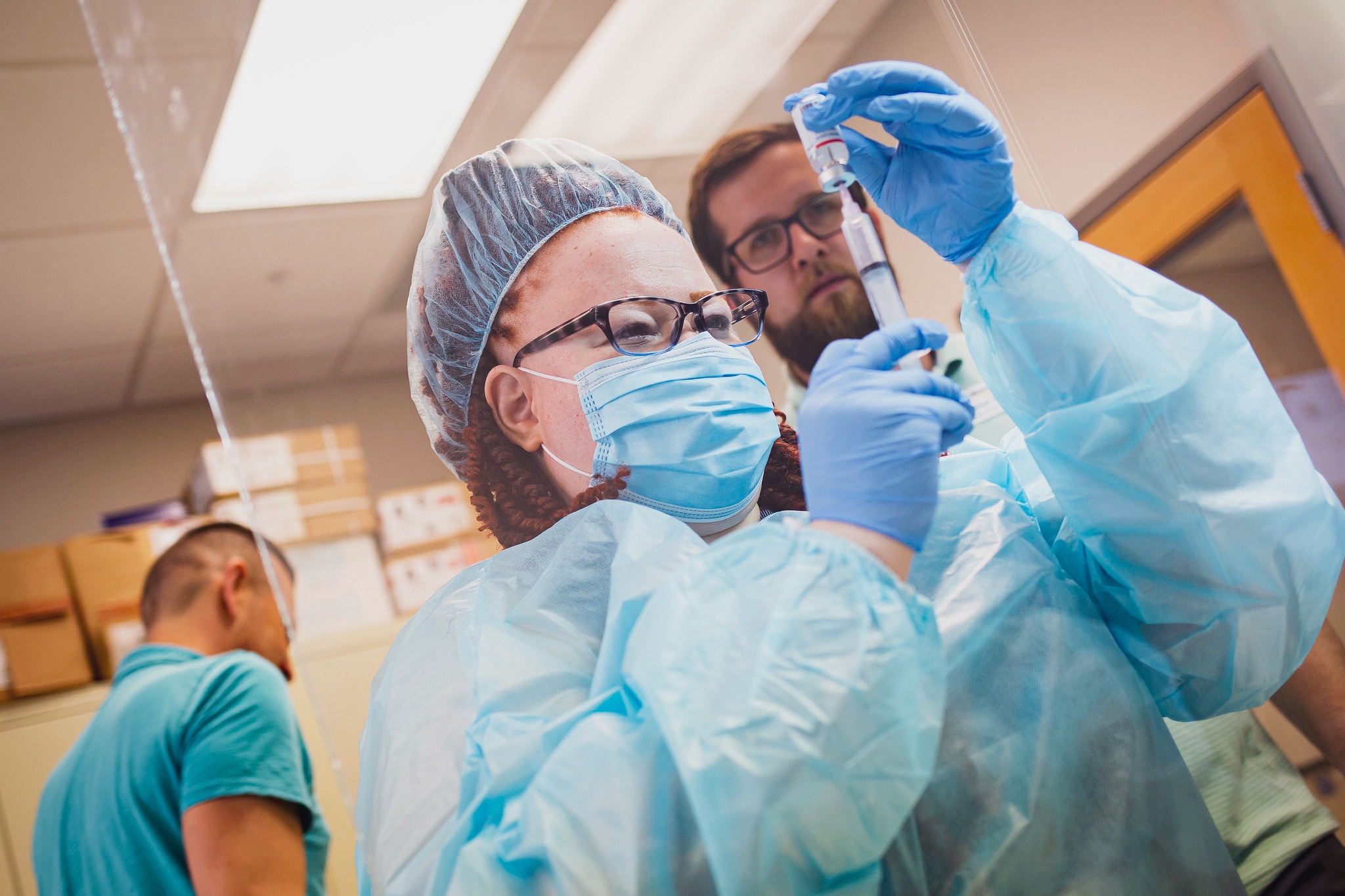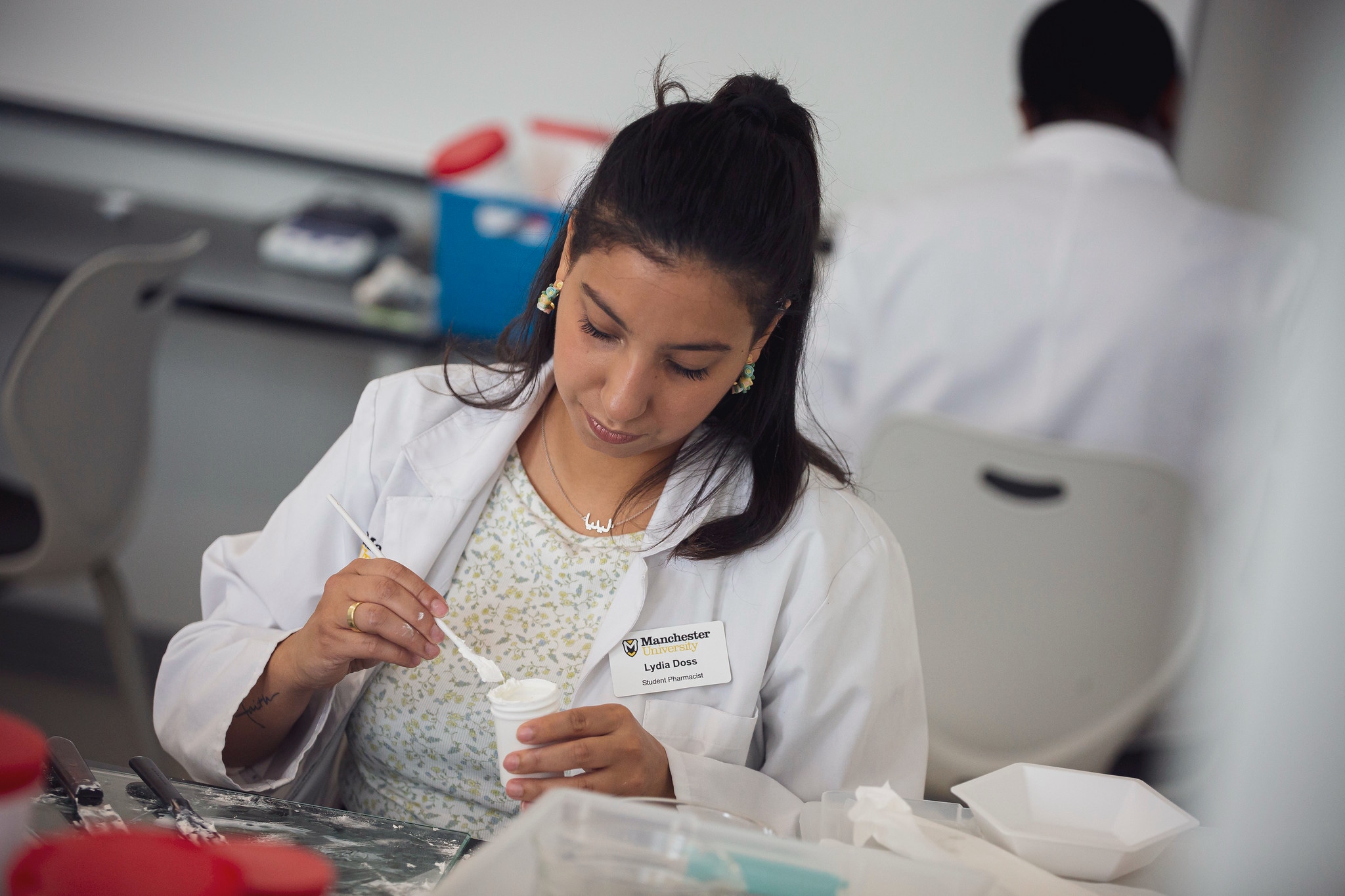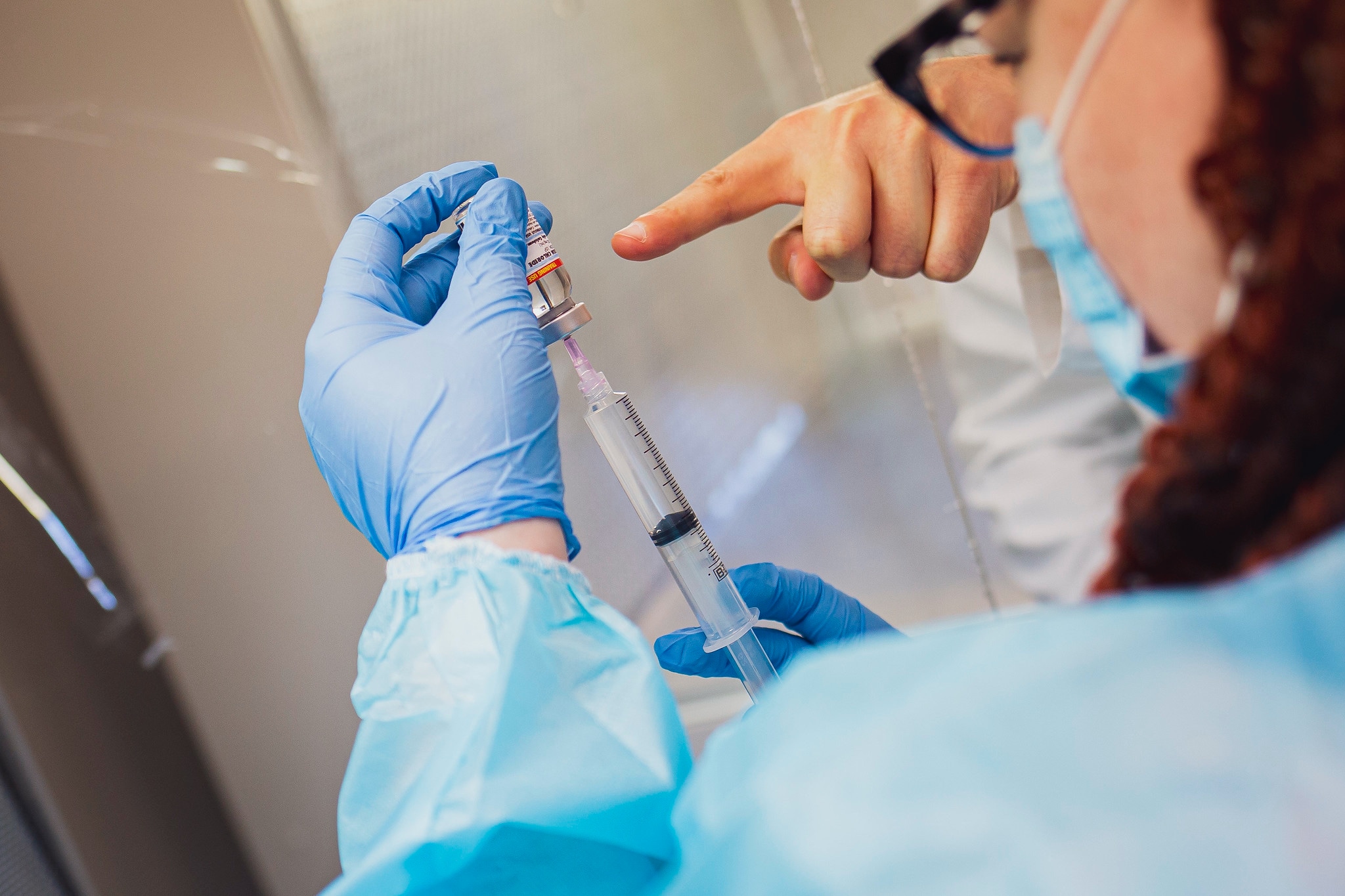Pharmacogenomics
Advance your career in personalized medicine with a Master’s in Pharmacogenomics. Manchester University offers both on-site and online PGx programs, allowing you to choose the format that best fits your lifestyle and learning preferences. Whether on campus or online, you’ll benefit from a comprehensive curriculum that combines classroom instruction, research, and expert faculty guidance to prepare you for the evolving world of genetic-based healthcare.

Pharmacogenomics Master’s Program for Science Majors, Pre-Health Students, and Related Fields
Manchester University’s Pharmacogenomics master’s program equips students from biology, chemistry, pre-med, and other science backgrounds to lead in the growing field of precision medicine. Through on-campus lab work and personalized instruction, you’ll explore how genetics impact drug response—and prepare for a future shaping patient care with genomic insight.
Program Information:
Master of Science (MS) in Pharmacogenomics
- 31 Credit Hours
Graduate Certificate
- 13 Credit Hours
- 5-6 Courses
BS / MS 4-year Program
- BS in Biology-Chemistry
- MS in Pharmacogenomics
- ~140 Credits

Ann Savariar, Assistant Professor of Pharmacogenomics

Why Choose MU for Your MS in Pharmacogenomics?

Nation’s First PGx Master’s Program
Expert Faculty & Research Mentorship
Small Class Sizes, Big Impact
State-of-the-Art Lab Access
Dual-Degree Pharm.D. Option
What You Can Do With Your Pharmacogenomics Degree
Laboratory Technician
Support genetic testing, drug development, and clinical PGx research projects.
Medical Science Liaison
Bridge communication between pharma companies and healthcare professionals using PGx.
Genetic Counselor (with advanced training)
Guide patients and clinicians on medication based on genetic profiles.
Ph.D. or Professional Degree Candidate
Pursue further education in pharmacy, medicine, or biomedical sciences.

Average Starting Salary for Pharmacogenomics Degree Holders
Graduates with a pharmacogenomics degree enter a promising and fast-growing career field. While PGx-specific salary data is still emerging, related roles show strong earning potential. According to the U.S. Bureau of Labor Statistics, genetic counselors earn a median salary of $89,990, while pharmacists average $128,570 annually. Many PGx professionals fall within or above this range, depending on their career path. Manchester University graduates also report an 89% success rate in either employment or continued education shortly after graduation.

How the PGx Program Supports Your Growth
Analytical Technology & Hands-On Lab Training
BS/MS 4-Year Program
For students looking to pursue careers in healthcare professions or a clinical lab career, Manchester offers a unique 4-year Dual Degree program that combines the BS in Biology-Chemistry degree with a Master’s in Pharmacogenomics. Students enrolled in the BS in Biology-Chemistry degree apply in their sophomore year for this dual degree program, and complete the MS in Pharmacogenomics course requirements as part of their junior and senior years.
This pathway is designed to help students transition confidently into health professional degree programs or clinical lab careers.
Pharm.D./MS in PGx Dual Degree
For students looking to expand their qualifications in pharmacogenomics, Manchester offers the Pharm.D./MS Dual Degree. Pharm.D. students can earn both their Doctor of Pharmacy and MS in Pharmacogenomics in the same timeframe by completing PGx courses during the summers of their pharmacy program.
This track is designed to remove guesswork, provide structure, and help students transition confidently into advanced genetic science careers.
Faculty Mentorship & Small Cohort Support
Student Groups and Professional Enrichment
At Manchester, students are encouraged to engage with the broader pharmacogenomics (PGx) community beyond the classroom. Through academic, professional, and research-focused opportunities, students build strong connections that support their future careers.
Students can participate in the Student Personalized Medicine Coalition (sPMC), a group that fosters collaboration across the PGx field. They also benefit from information sessions, admissions workshops, and networking events with faculty, alumni, and professionals in healthcare and biotech.
Manchester’s ongoing partnerships allow students to contribute meaningfully to the field. Recent highlights include:
-
Development of a database aligning U.S. FDA PGx data with Clinical Pharmacogenetics Implementation Consortium (CPIC) guidelines
-
A continuing education article authored for pharmacists on PGx and commonly prescribed medications
These experiences help prepare students for careers in areas like genetic counseling, Ph.D. research, and medical science liaison roles. We are always looking for new ways to connect our students with the evolving PGx landscape.
Obtain a Certificate in PGx for broader leadership roles
Enhance Patient Care
The Manchester Graduate Certificate in Pharmacogenomics (GC in PGx) is for health care professionals seeking to enhance, expand, and differentiate their practice and optimize the care they provide their patients.
The GC in PGx is comprised of five cutting-edge courses aimed at providing education into the depth and breadth of pharmacogenomics, so that practitioners can build their competencies and apply important foundational knowledge about PGx to their practice.
The 12 semester-credit-hour program provides approximately 180 contact hours, delivered 100% online. Additionally, these courses can be applied to completion of our Master of Science in Pharmacogenomics Program, which aims to train individuals in a broader leadership role in this exciting field.
Free Continuing Education offerings
Are you a pharmacist?
Check out this FREE continuing education offering from AdvanCE “Pharmacogenomics and Commonly Prescribed Medications,” written by MU students.

Curriculum
The comprehensive coursework of your degree in pharmacogenomics encompass 25 required credit hours and 6 elective credit hours of instruction.
View all courses of MU’s Master of Science in Pharmacogenomics Program.

On-site Course Schedule
Required Courses – 25 Credits
Summer Semester
- Biostatistics (1st half, online)- 3 credits*
- Introduction to PGx (2nd half, on campus)- 2 credits
- Human Genetics (2nd half, on campus)- 3 credits
Fall Semster
- Pharmacology- 3 credits
- Applied Pharmacogenomics- 3 credits
- Bioinformatics (1st half, online)- 3 credits
Spring Semester
- Advanced Molecular Biology-2 credits
- Advanced Pharmacokinetics- 2 credits
- Research Responsibility and Ethics (1st half, online)- 1credit
- The Gene-Drug Pipeline- 3 credits
Elective Courses – 6 Credits
- Pharmacogenomics in Neurologic and Cardiovascular Disorders- 3 credits
- Pharmacogenomics in Oncology- 2 credits
- Research and Innovative Practice Seminar- 1 credit
- Pharmacogenomics Laboratory 1 (2nd half, on campus)- 1 credit
- Pharmacogenomics Laboratory 2- 2 credits
- Pharmacogenomics Laboratory 3- 2 credits
*Students are not required to be on campus in Fort Wayne, Indiana, until the start of the second half of the summer semester which is typically early July.
Online MS Course Schedule
Required Courses – 25 credits
- Introduction to Pharmacogenomics – 2 credits
- Pharmacology- 3 credits
- Advanced Pharmacokinetics- 2 credits
- Human Genetics- 3 credits
- Biostatistics- 3 credits
- Advanced Molecular Biology – 2 credits
- Bioinformatics- 3 credits
- Applied Pharmacogenomics- 3 credits
- Research Responsibilities and Ethics- 1 credit
- The Gene-Drug Pipeline- 3 credits
Elective Courses – 6 credits required
- Pharmacogenomics in Neurologic and Cardiovascular Disorders- 3 credits
- Pharmacogenomics in Oncology- 2 credits
- Research and Innovative Practice Seminar- 1 credit
- Pharmacogenomics Laboratory Intensive (1 week course on campus)- 1 credit
31 credit hours program total.
The online program is designed to serve working individuals who want to fit their educational pursuits into an already busy schedule. Each course is 7 weeks long, and courses can be taken one at a time. An academic advisor works with you to plan an individual course sequence. For example, in a fall semester students can take Introduction to Pharmacogenomics in the first 7 weeks of the semester and then Pharmacology in the second 7 weeks of the semester.
Certificate Course Schedule
Required Courses | 8 Credits
- Introduction to Pharmacogenomics – 2 credits
- Applied Pharmacogenomics I – 3 credits
- Pharmacogenomics in Neurologic and Cardiovascular Disorders – 3 credits
Elective Courses | 5 Credits
- Advance Pharmacokinetics – 2 credits
- Human Genetics – 3 credits
- Biostatistics – 3 credits
- Advanced Molecular Biology – 2 credits
- Pharmacology – 3 credits
- Research Responsibilities and Ethics – 1 credit
- Bioinformatics – 3 credits
- The Gene-Drug Pipeline – 2 credits
- Pharmacogenomics in Oncology – 2 credits
- Research and Innovative Practice Seminar – 1 credit
- Pharmacogenomics Laboratory Intensive (1 week course) – 1 credit
PGx/NGx 592 Laboratory Intensive Information
What you will learn
This one-credit-hour, on-campus laboratory course introduces modern analytical techniques commonly used for DNA, RNA, and protein collection, isolation, preparation and analysis. Students will have the opportunity to actively engage in laboratory processes associated with pharmacogenomics. The course is one week in length and students will work for 40 hours during the week.
Techniques
- Laboratory Safety
- Accuracy and Precision in Pipetting
- Conversions and Dilutions
- DNA, RNA, and Protein Extraction and Quantification
- PCR and RT-PCR Techniques
- Cell Culture
- Western Blotting
- Open Array Sequencing
- Translational Software
Logistics
- Course is offered during Spring Break
- Monday – Friday, 8 a.m. – 5 p.m.
- Elective course offering for in the Master of Science in Pharmacogenomics and the Master of Science in Nutrition and Nutrigenomics Program
- Prerequisites: none
Meals
- Breakfast: Most hotels offer continental as part of the room rate
- Lunch: Provided on-site by the class
- Dinner: On your own
Tuition & Fees
| PGx/NGx 592 (1 CH): Lab Techniques Intensive | Costs |
| Tuition | $935 |
| Fees | *$530 |
*This course includes an additional laboratory fee.
Travel and Hotel
MUFW has an agreed rate for students at these four surrounding hotels and students are encouraged to use the links below:
- Hilton Garden Inn Fort Wayne North – $129
- Home2 Suites by Hilton Fort Wayne North –$119
- Hampton Inn Ft. Wayne Dupont Road –$89
- Comfort Suites North Fort Wayne –$79
Faculty
Ann Savariar, MS
Melanie Felmlee, PhD
Meet the Faculty
You Might Also Be Interested In These Programs

Admissions Requirements and Application Process
Recruitment Events & Program Information Sessions
Let’s connect!
We are ready and waiting to answer all your questions about our Master of Science in Pharmacogenomics!
For questions or more information contact us at gradadmissions@manchester.edu call 260-470-2703
Masters - Requirements
To be considered for the Master of Science in Pharmacogenomics, you must have:
- A bachelor’s degree in a science or science-related field; a master’s degree in a science or science-related field; or a relevant professional degree (medicine, dentistry, pharmacy, etc.). This degree must be equivalent to one conferred by a U.S. accredited institution.
- A minimum cumulative GPA of 2.7 on a 4.0 scale is preferred.
- A minimum science GPA of 2.7 on a 4.0 scale is preferred.
Masters - Course Equivalencies
To be sure the courses from your college or university satisfy prerequisite requirements for admission to Manchester, see the course equivalency chart for each of the following institutions. If your institution is not in this list, you may direct questions regarding coursework to the Office of Graduate Admissions or call 260-470-2703.
Masters - Application Process
The application for the on-site MS in Pharmacogenomics becomes available every August 18. The deadline for international students to submit their application is February 15. The deadline for domestic students to submit their application is April 15.
Application materials should be submitted through the Pharmacy Graduate Application Service (PharmGRAD). A completed PharmGRAD application is required to be considered for admission. This includes a personal statement and a resume/CV. In addition, you will be required to report all institution(s) attended on the PharmGRAD application and request all transcript(s) be sent directly from the institution(s) to PharmGRAD.
Applicants who studied outside the U.S. will be required to order a course-by-course foreign credit evaluation report from World Education Services (WES) and have it sent directly to PharmGRAD.
Certificate - Admissions Requirements
Do I qualify?
To be considered for admission to the graduate certificate program, candidates must:
- Possess a bachelor’s degree in science or a science related field (chemistry, biology, etc.); or a master’s degree in science or science related field (genetic counseling, etc.); or a professional degree (medicine, dentistry, pharmacy, etc.). The degree must be from a regionally accredited institution.
- A minimum cumulative GPA of 2.7 is preferred on a 4.0 scale
- A minimum science GPA of a 2.7 is preferred on a 4.0 scale
Certificate - Application Process
Applications for admission are accepted from August 18 through July 1 each year. Application materials are to be submitted through the Pharmacy Graduate Application Service (PharmGRAD). A completed PharmGRAD application is required to be considered for admission (a personal statement, resume/CV, report all institution(s) attended on the PharmGRAD application and request all transcript(s) be sent directly from the institution(s) to PharmGRAD). Applicants who studied outside the U.S. will be required to order a course-by-course foreign credit evaluation report from World Education Services (WES) indicating the US degree equivalency for each international institution attended and have it sent directly to PharmGRAD.
The annual admission cycle for the graduate certificate is as follows:
- August 18 – PharmGRAD application becomes available.
- December 15 – Application deadline for Spring Semester
- July 1 – Application deadline for Fall Semester.
International Students
International Admissions
As per government regulations, a program must apply for approval to admit international students. Manchester University has received approval from the Department of Homeland Security to admit students from outside the U.S for the following programs:
- Doctor of Pharmacy Program (on-campus program only)
- Master of Science in Pharmacogenomics Program (on-campus program only)
- Master of Athletic Training Program
- Master of Business Administration
Currently, international students are not eligible to apply to these Programs as they do not have approval from Homeland Security to accept international students:
- Doctor of Physical Therapy Program
- Accelerated Bachelor of Science in Nursing Program
- Master of Science in Nutrition and Nutrigenomics Program
Application
All international applicants must apply through the appropriate CAS. A completed CAS application is required to be considered for admission to all programs. Use the links below to view admission requirements, program specific prerequisites, and application deadlines.
Do not send admissions related documents to Manchester University directly. Please read the requirements for international applicants:
Additional Requirements for International Applicants and MBA Program Applicants
Students who already attend Manchester University and are interested in enrolling in one of the MBA Program’s three dedicated tracks only need to follow the guidelines outlined in this section.
TRANSCRIPTS:
Applicants who completed their degree(s)/studies outside the United States will be required to submit a course-by-course foreign credit evaluation report from World Education Services (WES) for each international institution attended directly to the appropriate CAS.
Verified copies of all collegiate transcripts:
- Step 1: Enter all institutions attended, domestic and international, in CAS application.
- Step 2: Please follow the steps outlined within the CAS application process to order this evaluation.
- Information about WES can be found at www.wes.org. Students are responsible for payment of fees to WES (not Manchester University) for this service.
English Proficiency:
International applicants must be able to read, speak, write and comprehend rapid idiomatic English. We do not offer ESL instruction. Therefore, the TOEFL or IELTS exam is required of all students whose language of instruction is not English. The following are minimum guidelines used to determine sufficient test scores for admission:
TOEFL paper-based test = 550
TOEFL iBT = 79
IELTS = 6.5
Testing locations and dates for these exams may be found on their web sites:
Test results must be entered into your CAS application and sent to the appropriate CAS.
Important: Applicants who were instructed in English may still be asked to submit a TOEFL or IELTS exam result in order to assess English proficiency.
Evidence of financial support:
Students must be able to show their ability to pay for their program studies in the United States. Students may self-fund their education or obtain a financial sponsor. Students with a financial sponsor must complete the Affidavit of Financial Support and return the document signed by the student’s sponsor to the Office of Graduate Admissions with proof of adequate funds to support you for at least one year. Such proof includes bank statements, employer testimony of salary, or government support letters.
*Evidence of financial support is not required for those enrolling into the MBA Program.
Statement of Non-Discrimination in the Admission Process
Manchester University is committed to non-discrimination in the admissions process. The University does not discriminate on the basis of national origin, ancestry, race, color, age, sex, gender identity or expression, sexual orientation, familial status, religion, disability, physical characteristics, or veteran status in admissions including its admission decisions and scholarships or loan awards.
Certified copies of marks, grades, and transcripts, if the degree(s) were received from institutions outside of the U.S.
Manchester will not accept transcripts directly submitted by students or institutions. All international transcripts must be submitted for evaluation to World Education Services. WES will then send Manchester University a copy of their evaluation. There is a fee for this evaluation that the student is in charge of paying and the evaluation can take 2-4 weeks. If you are transferring from a university outside the U.S., you also must have the transcript evaluated by World Education Services. Admission and transfer of credits cannot be finalized until we receive the report from WES.

Costs and Financial Aid
The cost of attendance is designed to provide students with an accurate projection of reasonable cost associated with attending Manchester University. The cost of attendance reflects reasonable cost that a typical student with a modest lifestyle may incur to attend the University. The cost of attendance does not represent a student’s actual charges/experience. The exact cost will vary.

FAQs About the Pharmacogenomics Degree
What is pharmacogenomics and why is it important?
This field plays a pivotal role in advancing personalized healthcare. By integrating human genetics with pharmacology, pharmacogenomics supports clinical implementation strategies that are transforming the pharmaceutical industry. It is especially critical for patients with complex medical histories or those who have experienced treatment resistance or adverse drug events.
Manchester University’s pharmacogenomics program prepares students to lead in this growing field. Students gain hands-on experience and foundational knowledge needed for real-world settings, learning how genetic testing intersects with medicine, pharmacy, and data analysis. The program’s customizable curriculum makes it ideal for those with a background in biochemistry, medical genetics, or pharmaceutical sciences.
As precision medicine continues to evolve, the demand for professionals with a pharmacogenomics degree will increase, fueling career opportunities in genetic counseling, laboratory analysis, research, and clinical pharmacogenomics.
How long does it take to complete the MS in Pharmacogenomics?
The pharmacogenomics program offers a customizable curriculum that combines classroom-based learning with extensive hands-on experience. Students work with cutting-edge equipment, including PCR sequencing tools and platforms like the Agena MassARRAY. The analytical technology sequence prepares students for roles that demand technical expertise in genetic testing, drug development, and personalized medicine.
Whether students are transitioning from a bachelor’s degree in science or looking to complement their pharmacy background, this pharmacogenomics degree allows for an accelerated and impactful academic experience. Many students enrolled in the program use it as a launchpad toward advanced degrees in genomic medicine, pharmacy, or medical school.
Manchester also offers flexible online programs for those seeking alternative learning environments, including an online MS in PGx and a graduate certificate. Regardless of delivery format, all programs emphasize personalized healthcare, real-world training, and preparation for clinical implementation in healthcare settings.
What career paths are available with a master’s in pharmacogenomics?
Another growing area is the role of a medical science liaison or PGx consultant, where graduates bridge the gap between the pharmaceutical industry and clinical practice. These professionals use their pharmacogenomics knowledge to educate healthcare providers on how to implement personalized medicine effectively.
Some graduates pursue doctoral or professional education in fields like pharmacy, medicine, and human genetics. Others specialize further through online programs in medical genetics or genetic counseling. With hands-on experience in lab settings and coursework rooted in personalized healthcare, graduates are well-positioned to pursue careers in clinical pharmacogenomics, pharmaceutical research, or education.
The program also helps prepare students for emerging roles in genomic medicine and clinical pharmacology, including positions in regulatory affairs, data analysis, or healthcare policy. Ultimately, a pharmacogenomics degree from Manchester offers flexible, science-driven career paths in a field expected to grow significantly in the next decade.
What makes Manchester’s PGx program unique?
What sets Manchester’s pharmacogenomics program apart is its blend of personalized instruction, real-world lab experience, and academic leadership. Students benefit from a low student-to-faculty ratio (10:1), allowing for individualized mentorship throughout the program. Faculty are active researchers and practitioners in pharmacogenomics, clinical implementation, and pharmaceutical sciences—offering insight into both theory and practice.
The program emphasizes hands-on experience. Students engage with advanced equipment such as the QuantStudio 12 and Agena MassARRAY, mastering techniques critical to pharmacogenomic testing and genetic analysis. Whether students are preparing for careers in genetic counseling, pharmacy, or personalized healthcare, they graduate with practical skills employers value.
The curriculum is customizable and flexible, offering options like dual degrees (Pharm.D./MS), a BS-to-MS track, and online options for distance learners. Students graduating from the program join a network of professionals driving innovation in genomic medicine, making Manchester’s PGx program a top choice for aspiring leaders in the field.
Can I apply my PGx degree toward further education?
The pharmacogenomics program is structured to align with the prerequisites and expectations of advanced academic paths. Courses emphasize critical thinking, lab skills, and genetic data analysis—all vital in postgraduate environments. The real-world lab experience students gain, including the use of tools like PCR sequencing and mass spectrometry, enhances their qualifications for research assistantships or clinical fellowships.
Manchester also offers dual-degree opportunities, such as a combined Pharm.D. and PGx master’s degree. These accelerated tracks are ideal for students enrolled in healthcare-focused programs who want to deepen their understanding of personalized medicine and pharmacogenomic testing.
Whether students are planning to enter the pharmaceutical industry, academia, or clinical settings, the PGx master’s degree prepares them with the academic rigor and scientific literacy needed to succeed. It’s a stepping stone toward leadership roles in genomic medicine and personalized healthcare.
Is hands-on experience included in the PGx program?
This extensive lab exposure is essential for preparing students to enter a range of healthcare, research, and industry positions. Whether pursuing careers in personalized medicine, drug development, or genetic counseling, students graduate with the technical fluency and confidence to thrive in fast-paced clinical and research settings.
The program’s faculty members, many of whom are active researchers in pharmacogenomics and personalized healthcare, guide students through lab protocols, data analysis, and interpretation of genomic results. This mentorship helps bridge classroom knowledge with hands-on clinical implementation, making the experience both rigorous and relevant.
Students enrolled in the on-campus program benefit from small cohort sizes and close collaboration with faculty, while those in the online programs also have opportunities for practical learning through virtual labs, simulations, and hybrid options. Manchester’s commitment to experiential education ensures graduates are ready to lead in the growing field of precision medicine.
Is financial aid available for PGx students?
The University’s Office of Financial Aid works closely with students to navigate tuition costs, estimate funding options, and understand timelines for disbursement. Whether you’re a recent graduate with a bachelor’s degree or a working professional returning to school, Manchester offers resources tailored to your needs. This includes assistance for international students and those enrolled in dual-degree or accelerated tracks, such as the BS-to-MS or Pharm.D./MS options.
Investing in a pharmacogenomics degree can open the door to high-impact career opportunities in healthcare, data analysis, and personalized medicine. With median salary projections showing strong returns for professionals in genetics-related fields, this master’s degree offers not only academic value but long-term professional benefits.
Whether you’re attending on campus in Fort Wayne or pursuing the degree remotely, Manchester ensures that every student receives the financial guidance and support needed to succeed.
FAQs About the Online Pharmacogenomics Degree
How many credit hour are required for the online MS in PGx degree?
Are international students eligible to enroll in the online master's program?
Yes, we are currently accepting applications from international students for the online program.
Can I complete the online master's program part-time?
Am I able to take a break from the online master's program if I need to?
Does the program have to be completed within a certain timeframe?
What is the lecture format? Do the courses have video or audio lectures, or other interactive pieces?
Do courses need to be completed in a certain order?
Do students have to login at specific times of the day?
How quickly can students expect faculty members to reply with questions?
What academic support is available if I am struggling in a class?
Will online master's students be assigned a faculty advisor/mentor?
How many hours per week will I spend on coursework?
Does Manchester University offer technical support for online master's students?
Outside of business hours, requests can be submitted using an online form found at: https://service.manchester.edu/welcome.portal. Our learning management system, Canvas, provides 24/7 support. All students can use the Manchester University Canvas support line at 877-227-9487 or use Canvas’ live chat option.
What are your online learning center platforms?
FAQs About the Graduate Certificate in PGx
When can new students enroll in the Graduate Certificate in Pharmacogenomics Program?
There are three times per year that new students can apply to the Graduate Certificate in Pharmacogenomics, spring, summer and fall.
Do I need to take the GRE to be considered for the Graduate Certificate in Pharmacogenomics?
No, the GRE is not required for the Graduate Certificate in Pharmacogenomics.
Does the Graduate Certificate in Pharmacogenomics have to be completed within a certain timeframe?
Technology in PGx changes rapidly and we want to ensure that our graduates have received the most up-to-date training at the point of graduation. In order to ensure that our graduates are prepared, we require all course work to be completed within two years of the student’s start date.
Can I transition from the GC to the MS?
Yes
May I request transfer credits for the Graduate Certificate in Pharmacogenomics?
No
Master of Science in Pharmacogenomics Program Outcomes
Program Outcomes
Cutting Edge Career Opportunities
With an MS in PGx, you will be ready for employment in the genetic testing and pharmaceutical industries as an applied scientist who can work on all aspects of pharmacogenomics testing including sample accessioning and preparation, sample analysis, data storage, data mining and reporting. You will also be equipped to pursue a Ph.D. or a professional degree in fields like medicine, pharmacy or dentistry. This program can also expand your capabilities in professional fields, such as genetic counseling.
PGx graduates, graduating classes of 2017-2021, report an 89 percent success rate after graduation.
Graduate results were updated in May 2022. Results are based on 100 percent knowledge rate (the percent of graduates for which the institution has reasonable and verifiable information concerning the graduates’ post-graduation career activities). Post-graduate success is defined as employment or enrollment in a program of continuing education.
Accreditation
Non-Discrimination in the Admission Process
Manchester University is committed to non-discrimination in campus life. The University does not discriminate on the basis of national origin, ancestry, race, color, age, sex, gender identity or expression, sexual orientation, familial status, religion, disability or veteran status in admissions or any area of campus life, including its educational programs, scholarships and loan awards, residence life programs, athletic programs, extracurricular programs, promotion and tenure policies and practice, and alumni affairs.
Manchester University is committed to carry out the provisions of Section 504 of the Rehabilitation Act of 1973 and the Americans With Disabilities Act, which provide for accessibility of University programs to the physically disabled.











